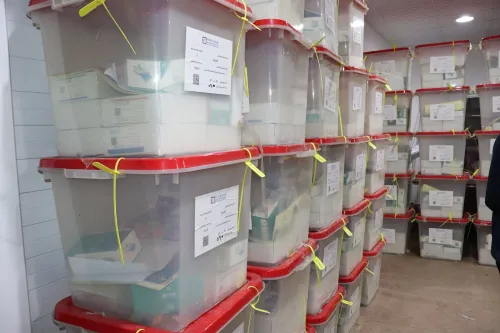How is Namibia Encouraging Youth to Adopt Tech-Driven Farming?

Synopsis
Key Takeaways
- Namibia prioritizes youth engagement in agriculture.
- Technology is essential for sustainable farming practices.
- Agriculture is crucial for Namibia’s economy.
- Climate-smart methods are necessary to combat environmental challenges.
- Strategic initiatives aim to reduce import dependence.
Windhoek, Oct 8 (NationPress) The President of Namibia, Netumbo Nandi-Ndaitwah, called on the nation’s youth to adopt advanced, technology-driven agricultural practices. She highlighted the urgent need for rejuvenating the workforce in agriculture due to an aging demographic and escalating climate challenges that jeopardize long-term food security.
While addressing the Agricultural Outlook Conference 2025 in Windhoek, Namibia's capital, Nandi-Ndaitwah stressed that the nation’s economic future hinges on boosting agriculture through youth engagement, innovation, and investment, as reported by Xinhua News Agency.
Despite improvements in food and nutrition security, some undernourishment levels remain, necessitating a supportive environment that fosters connectivity, creativity, and access to finance to fulfill agriculture’s essential role.
Agriculture is the primary employer in Namibia, with approximately 70 percent of the population dependent on livestock and crop value chains.
Nandi-Ndaitwah pointed out that the government has prioritized agriculture as one of the eight essential economic enablers within the Sixth National Development Plan.
This plan directly correlates agriculture with industrialization, job creation, and food self-reliance, demonstrating a conscious effort to position agriculture at the forefront of Namibia's development.
“Agriculture transcends mere food production; it embodies dignity, sovereignty, and our role in the global economy,”
Nandi-Ndaitwah emphasized, reaffirming the government's dedication to enhancing partnerships with farmers, agribusinesses, and investors to boost irrigation, enhance market access, and facilitate value addition.
The president also advocated for the implementation of climate-smart farming techniques, including improved soil management, water-efficient irrigation, and digital innovations to combat droughts, land degradation, and changing weather patterns.
This year's Agricultural Outlook Conference, themed “Harvesting the Future,” gathered farmers, researchers, agribusiness leaders, and global experts to discuss strategies for inclusive growth, sustainability, and empowering youth within Namibia's agricultural value chains.
In September, Namibia launched a comprehensive national strategy aimed at transforming its crop sector, enhancing food sovereignty, and decreasing reliance on agricultural imports.
This strategy was introduced in Windhoek by Minister of Agriculture, Fisheries, Water, and Land Reform, Inge Zaamwani, who presented several key documents, including the Namibian Agronomic Board's annual report, the Five-Year Integrated Business Plan, Five-Year Crop Value Chain Development Strategy, and the Potato Development Scheme.
“These milestones represent a renewed commitment to revolutionize the crop subsector and accelerate food self-sufficiency,”
Zaamwani stated.
She elaborated that the new strategic direction is encapsulated within the Five-Year Integrated Strategic Business Plan and the Five-Year Crop Value Chain Development Strategy.
According to her, this strategy is designed to holistically address all aspects of the crop subsector, from inputs (seeds, fertilizers, equipment), production, processing, storage, to marketing.
The minister highlighted that the immediate priority initiative is the Potato Development Scheme, which aims to enhance local production, generate jobs across the potato value chain, and reduce import dependency. This initiative will also promote agro-processing of products like chips, crisps, and starch, serving as a model for similar schemes in other key crops.
Zaamwani concluded that by unveiling these plans, Namibia is setting a trajectory towards a sustainable, resilient, and globally competitive crop sector.










